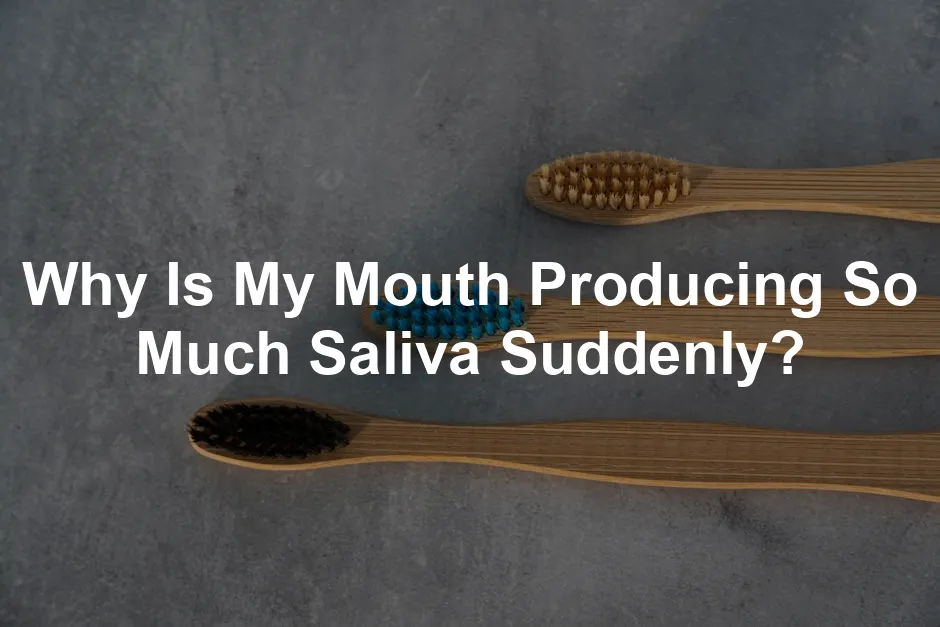
Why Is My Mouth Producing So Much Saliva Suddenly?
Introduction
Have you noticed a sudden increase in saliva production? This condition is known as hypersalivation or ptyalism. It’s more common than you might think and can stem from various causes. In this article, we’ll explore the reasons behind excess saliva, its symptoms, and potential treatments.
Summary and Overview
Saliva is a vital fluid produced by salivary glands, essential for oral health. It aids in digestion, helps maintain moisture, and protects your mouth from infections. Hypersalivation refers to the production of saliva beyond normal levels, leading to discomfort. Unlike regular saliva flow, it can cause drooling and social embarrassment. The impact of excessive saliva can affect daily life, from speaking to eating. In the following sections, we’ll discuss what saliva is, what triggers hypersalivation, and how to address it effectively.

Understanding Saliva
What Is Saliva?
Saliva is a clear fluid made up of water, electrolytes, enzymes, and antibacterial compounds. Its primary functions include aiding digestion by breaking down food, washing away food particles, and controlling bacteria in the mouth. Saliva also enhances taste perception, making eating a pleasurable experience. A healthy amount of saliva is crucial for maintaining oral hygiene and supporting overall health. Without it, you might struggle with dry mouth, difficulty swallowing, and bad breath. Proper saliva production is key to enjoying your meals and ensuring good oral health.
What Is Hypersalivation?
Hypersalivation, or excessive saliva production, occurs when salivary glands produce more saliva than normal. Common symptoms include drooling, difficulty swallowing, and feeling like your mouth is constantly wet. This condition can be temporary or chronic. Temporary hypersalivation might happen due to specific triggers, like certain foods or medications. Chronic hypersalivation persists over time and often indicates an underlying health issue. Understanding the distinction between these types is crucial for effective management. If you’ve been experiencing this, you’re not alone, and it’s worth exploring the reasons behind it.
Causes of Increased Saliva Production
Dietary Triggers
Certain foods can cause your mouth to produce more saliva. For instance, acidic foods like lemons and oranges stimulate salivary glands. Spicy dishes can also trigger this response, as they irritate the mouth’s lining. Sugary foods may lead to increased saliva as your body tries to wash away the sweetness. This physiological reaction helps with digestion and protects your teeth. If you’ve recently indulged in such foods, a spike in saliva production may be completely normal.

To keep your hydration game strong while enjoying your favorite treats, consider using a Water Bottle with Straw. It’s perfect for sipping on the go and ensures you stay hydrated without making a mess. Plus, who doesn’t love a good straw?
Medical Conditions
Several medical conditions can contribute to increased saliva production. Pregnancy is a well-known cause, especially during the first trimester, when hormonal changes can lead to hypersalivation. Gastroesophageal reflux disease (GERD) may also play a role; acid from the stomach irritates the throat, prompting more saliva production as a protective measure. Neurological disorders, such as Parkinson’s disease and cerebral palsy, affect muscle control, making it hard to swallow or clear saliva effectively. In these cases, hypersalivation can be a symptom of the condition itself. Other conditions like Down syndrome and infections can also result in excess saliva. Recognizing these links can help you understand your symptoms better.
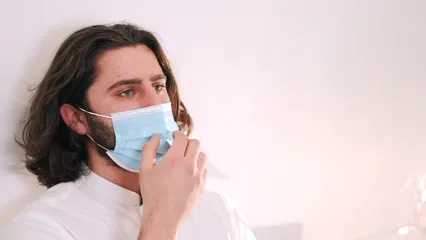
Medication Side Effects
Certain medications can lead to increased saliva production, a condition known as hypersalivation. Common culprits include antipsychotics, anticonvulsants, and some pain relievers. These medications can stimulate the salivary glands or impair swallowing, causing saliva to accumulate. For example, drugs like clozapine and certain antidepressants have been linked to this side effect. Understanding how your medications affect your body is crucial. If you notice a sudden increase in saliva after starting a new prescription, consult your healthcare provider for potential alternatives or adjustments.
Oral Health Issues
Oral health problems, such as infections and cavities, can trigger excessive saliva production. When bacteria invade the mouth, your body responds by producing more saliva to wash them away. Conditions like gingivitis or dental abscesses can lead to this reaction. Similarly, poor dental hygiene allows bacteria to thrive, prompting the salivary glands to work overtime. This natural defense mechanism helps combat infections but can result in discomfort and embarrassment. Maintaining good oral hygiene is essential to prevent these issues and manage saliva levels effectively.
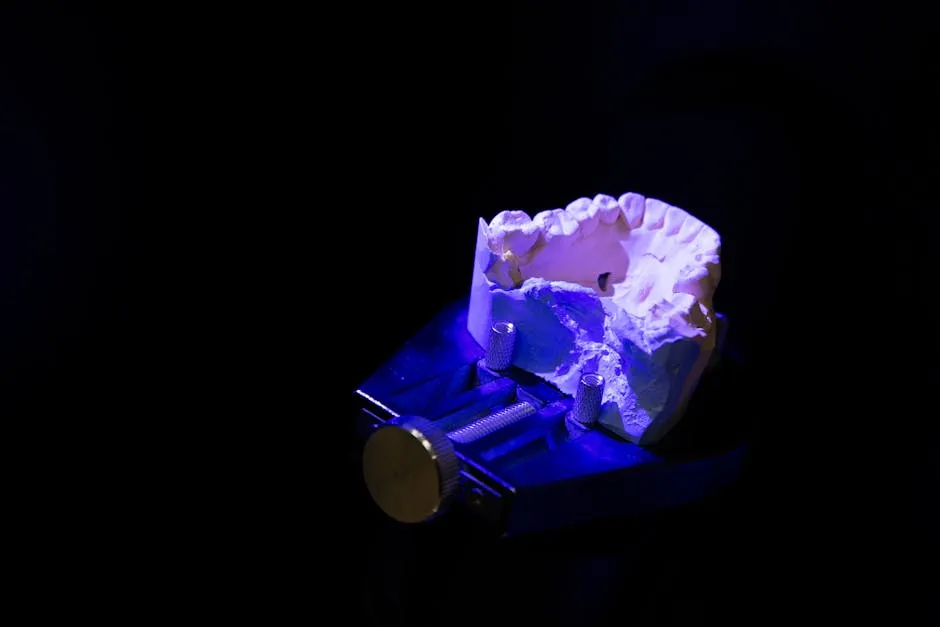
Speaking of oral hygiene, have you considered upgrading your brushing routine? The Oral-B Pro 1000 Electric Toothbrush is a game changer. It cleans your teeth more effectively than a manual brush and helps you maintain that sparkling smile!
Psychological Factors
Stress and anxiety can significantly impact saliva production. When you’re anxious, your body enters a heightened state of alertness, often resulting in increased saliva flow. It’s fascinating how emotional states can influence physiological responses. For many, public speaking or stressful situations lead to a dry mouth, while others may experience the opposite effect. If you find that stress triggers excess saliva, consider relaxation techniques or speaking with a mental health professional. Managing your emotional health can help regulate your body’s responses.

Symptoms and Complications of Hypersalivation
Common Symptoms
Hypersalivation can lead to several noticeable symptoms. You might experience drooling, especially when talking or sleeping. Chapped lips are common due to constant moisture exposure. Bad breath can also occur, as excess saliva may trap bacteria in your mouth. These issues can greatly affect daily life. Imagine feeling self-conscious while speaking or eating in public. Such symptoms can also impact self-esteem, making social interactions uncomfortable. If you’ve noticed these signs, you’re not alone. Many people experience similar challenges, and it’s essential to understand their implications.

Complications
If left untreated, hypersalivation may lead to serious complications. One significant risk is aspiration pneumonia, which occurs when excess saliva enters the lungs, potentially causing infection. Skin infections can arise around the mouth due to constant moisture, leading to discomfort and irritation. Moreover, persistent hypersalivation can create difficulties with swallowing and speaking, further complicating communication. If your symptoms persist, seeking medical advice is crucial. Early intervention can prevent complications and improve your quality of life.
Diagnosing Excessive Salivation
Medical Evaluation
To diagnose hypersalivation, a healthcare provider will begin with a thorough evaluation. They will ask about your medical history and any medications you take. A physical examination of your mouth and throat is common, assessing for signs of infections or other issues. Tests may include imaging studies or swallowing assessments to gauge saliva control. Understanding your symptoms is vital for identifying underlying causes. This comprehensive approach ensures you receive the most effective treatment tailored to your needs. If you’re experiencing excessive saliva, don’t hesitate to consult a healthcare professional.
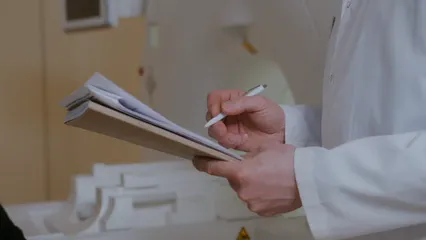
Treatment Options for Hypersalivation
Medical Treatments
If you’re dealing with excessive saliva, several medical treatments may help. Anticholinergic medications are often prescribed to reduce saliva production. These drugs block the neurotransmitter acetylcholine, which stimulates salivary glands. Common options include glycopyrrolate tablets and scopolamine transdermal patch.
Another effective treatment is Botox injections. This involves injecting botulinum toxin into the salivary glands. The toxin temporarily paralyzes the glands, leading to a significant reduction in saliva production. This option is particularly useful for those who don’t respond well to medications.

In severe cases, surgery might be necessary. Procedures can include the removal of salivary glands or alterations to their function. Surgery is usually a last resort but can provide relief for individuals with chronic hypersalivation. Always consult your healthcare provider to discuss which option is best for you.
Home Remedies and Lifestyle Changes
Managing hypersalivation at home can be effective with simple lifestyle changes. Start by staying hydrated. Drinking enough water helps regulate saliva consistency and reduces discomfort.
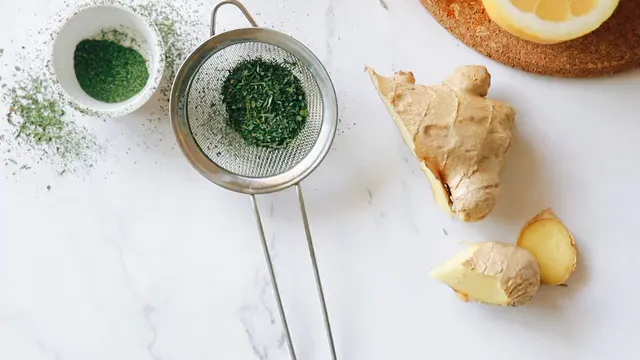
Good oral hygiene is essential, too. Regular brushing and flossing can minimize bacteria that trigger excess saliva. You might also consider avoiding foods that increase saliva production, such as sour or spicy items.
Chewing sugar-free chewing gum can help control saliva levels by encouraging swallowing. Finally, practicing relaxation techniques can also reduce stress-induced saliva flow. Implementing these changes can significantly improve your comfort and confidence in daily life.
Conclusion
Understanding why your mouth suddenly produces excess saliva is crucial. Hypersalivation can stem from various causes, including medications, diet, and underlying health conditions. While treatments range from medical options to home remedies, it’s essential to find a solution that works for you. If hypersalivation persists, don’t hesitate to consult your healthcare provider for personalized advice. Addressing this condition can enhance your quality of life and overall well-being. Remember, you’re not alone in this, and help is available.

Additionally, consider investing in a digital thermometer to keep track of your health or a first aid kit for those unexpected moments. Health is wealth, after all!
Please let us know what you think about our content by leaving a comment down below!
Thank you for reading till here 🙂
All images from Pexels




